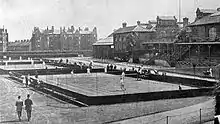Queen's Club
The Queen's Club is a private sporting club in West Kensington, London, England. The club hosts the annual Queen's Club Championships grass court men's lawn tennis tournament (currently known as Fever-Tree Championships for sponsorship reasons). It has 28 outdoor courts and eight indoor. With two courts, it is also the national headquarters of real tennis, hosting the British Open every year excepting 2020 due to the coronavirus pandemic. The Queen's Club also has rackets and squash courts; it has now become the headquarters for both these sports due to the Prince's Club closure in 1940.
 | |
| Formation | 1886 |
|---|---|
| Type | Private members' club |
| Purpose | Sport |
| Location |
|
| Coordinates | 51°29′15″N 0°12′42″W |
Chief executive | Ross Niland (as of 2019)[1] |
| Website | www |



History
Founded as The Queen's Club Limited on 19 August 1886 by Evan Charteris, George Francis and Algernon Grosvener, the Queen's Club was the world's second multipurpose sports complex, after the Prince's Club, and became the world's only multipurpose sports complex when the Prince's Club relocated to Knightsbridge and lost its outdoor sports facilities.[2] The club is named after Queen Victoria, its first patron. The first lawn tennis courts were opened on 19 May 1887, and the first sporting event was held on 1 and 2 July 1887 when Oxford played Cambridge. The club buildings were opened in January 1888, having taken about 18 months to construct. William Marshall, finalist of the inaugural 1877 Wimbledon Championships was the architect.[3] Among the initial sports offered at the club were real tennis, Eton Fives, rackets, lawn tennis (grass courts and covered courts), football, rugby and athletics. Cricket was also played, but not as an organised sport. The University Sports meeting between Cambridge and Oxford was held at the Queen's Club from 1888 to 1928.[4]
Queen's Club was the venue of the covered courts (indoor) tennis, jeu de paume (real tennis) and rackets events of the 1908 Summer Olympics.[5]
Until 1922, the club was the main ground for the football games of Corinthian F.C. One international was held, between England and Wales on 18 March 1895, the result being a 1–1 draw.
Sale of Queen's Club
On 13 September 2005, the Lawn Tennis Association (LTA), the governing body of British lawn tennis, which had owned Queen's since 1953, put the club up for sale. The terms required that the rackets club and the Queen's Club Championships remain unaffected (the site's value for residential or commercial redevelopment might greatly exceed its value as a sports club, in the event that planning permission could be obtained, and the LTA wished to preserve the club's role in British tennis).
On 8 March 2006, the LTA announced that it would sell to club members for £45 million, ending seven months of uncertainty about the club's future.[6] However some members disputed the LTA's right to sell the club, which they contested it merely held in trust on their behalf, and began to raise funds to dispute the sale in court.[7] In December 2006, the two sides reached an out-of-court settlement in which the sale price was reduced to £35 million.[8][9]
In February 2007, the LTA relocated its headquarters from Queen's Club to the new National Tennis Centre in Roehampton. The Fever-Tree Championships remains one of the six most popular grass competitions on the men's ATP tour, along with the Halle Open in Germany, the Aegon International in Eastbourne, the Hall of Fame Open in Rhode Island, the Rosmalen Championships in the Netherlands, and Wimbledon.
The ball girls are selected from year 8, 9, and 10 pupils at St Philomena's Catholic High School for Girls in South London and Nonsuch High School for Girls in Surrey.
See also
References
- Watterson, Johnny (13 May 2020). "Meet the Irishman in charge at one of sport's most exclusive clubs". The Irish Times. Retrieved 13 December 2020.
- McKelvie, Roy (1986). The Queen's Club Story, 1886-1986. London: Stanley Paul. p. 13. ISBN 0091660602.
- McKelvie, p. 14
- McKelvie, p. 15
- 1908 Summer Olympics official report. pp. 220 (covered courts tennis), 233 (rackets) & 314 (jeu de paume).
- Bloomberg. "London's Queen's Club Sold to Members for 45 Million Pounds". Archived from the original on 7 May 2006. Retrieved 25 April 2006.
- Mark Hodgkinson (9 June 2005). "LTA legal threat from Queen's Club rebels". The Telegraph.
- "LTA sells Queen's Club for £35m". BBC. 14 December 2006.
- "LTA end Queen's Club dispute". The Telegraph. 14 December 2006.
External links
 Media related to Queen's Club at Wikimedia Commons
Media related to Queen's Club at Wikimedia Commons- The Queen's Club
- St. Philomena's Catholic High School for Girls website
- The Tennis & Rackets Association
| Preceded by First Edition |
Fed Cup Final Venue 1963 |
Succeeded by Germantown Cricket Club Philadelphia |
